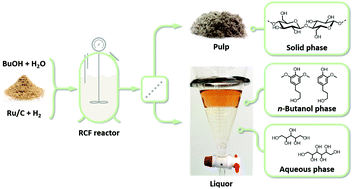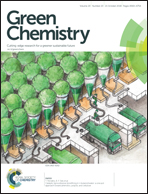Catalytic lignocellulose biorefining in n-butanol/water: a one-pot approach toward phenolics, polyols, and cellulose†
Abstract
Lignocellulose constitutes an alluring renewable feedstock for the production of bio-based chemicals. In this contribution, we propose a chemocatalytic biorefinery concept that aims to convert lignocellulosic biomass (Eucalyptus sawdust) into (i) lignin-derived (mono)phenolics, (ii) hemicellulose-derived polyols, and (iii) a cellulose pulp. This is achieved by processing biomass in an equivolumetric mixture of n-butanol and water at elevated temperature (200 °C), in the presence of Ru/C and pressurised hydrogen (30 bar). During this one-pot Reductive Catalytic Fractionation (RCF) process, the hot liquor enables the extraction and solvolytic depolymerisation of both lignin and hemicellulose, while the catalyst and reductive environment are essential to hydrogenate reactive intermediates (coniferyl/sinapyl alcohol and sugars) toward stable target products (phenolics and polyols, respectively). After the catalytic reaction, the solid carbohydrate pulp (mainly cellulose) is easily retrieved upon filtration. Phase separation of n-butanol and water occurs upon cooling the liquor (<125 °C), which offers a facile and effective strategy to isolate lignin-derived phenolics (n-butanol phase) from polyols (aqueous phase). The three resulting product streams provide a versatile platform for down-stream conversion, en route to bio-based chemicals. A proof-of-concept experiment using a 2 L batch reactor demonstrates the scalability potential. Furthermore, this contribution highlights that the conversion of each biopolymer is influenced in a different way by reaction parameters like catalyst, hydrogen pressure, temperature, and acidity (HCl). The key challenge is to find suitable conditions that allow (close-to-)optimal valorisation of all constituents.



 Please wait while we load your content...
Please wait while we load your content...